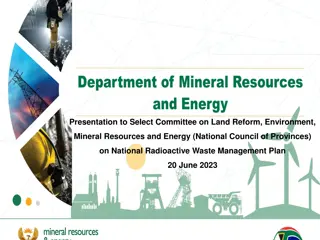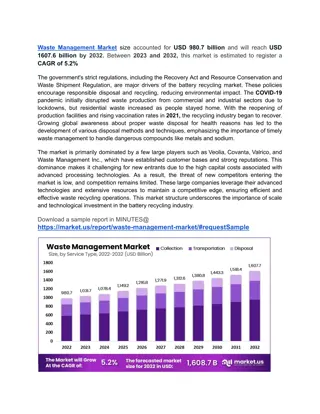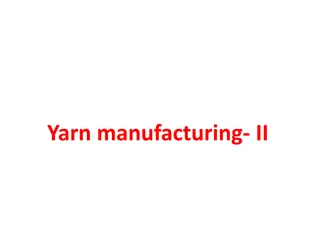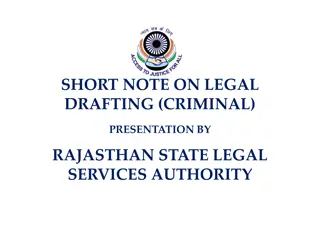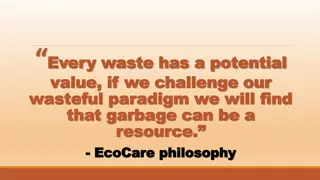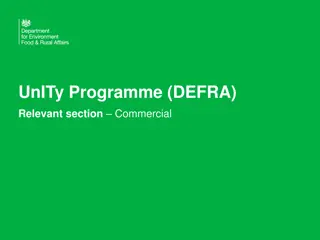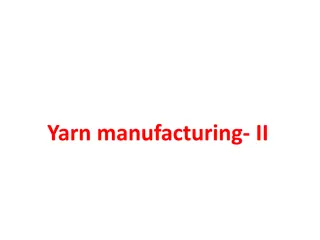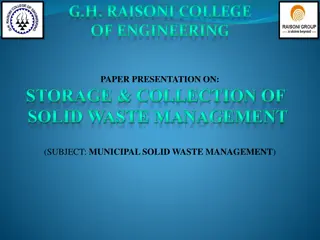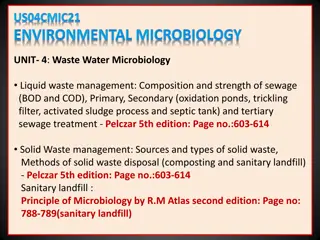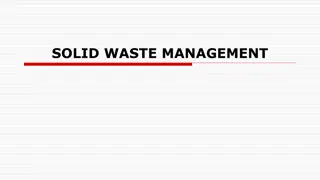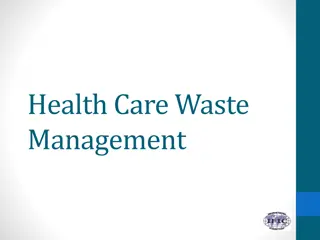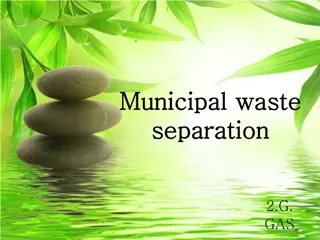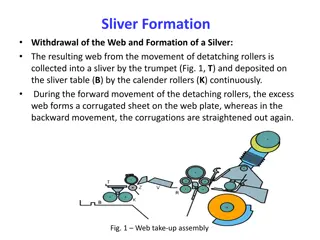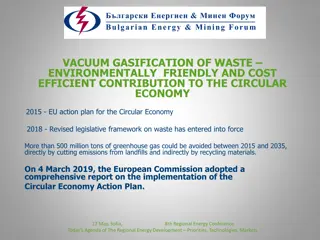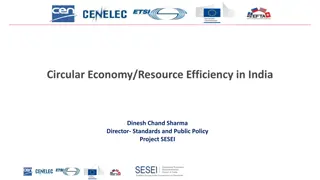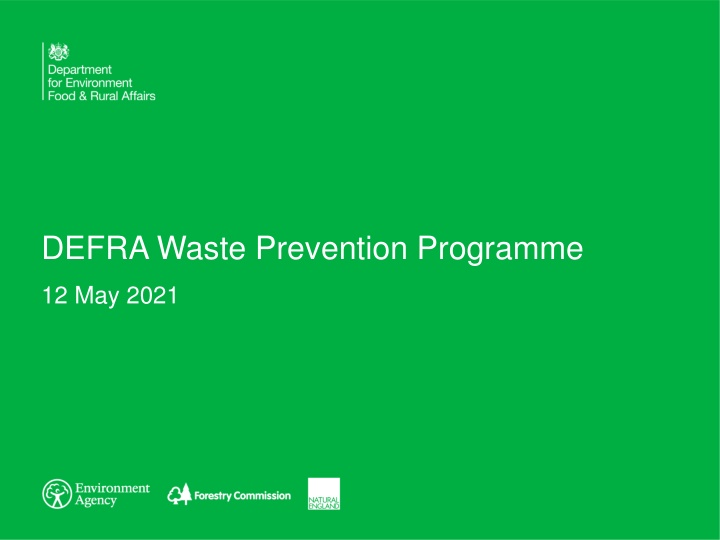
DEFRA Waste Prevention Programme - Drafting a Resource-Efficient Economy
DEFRA Waste Prevention Programme aims to enhance resource efficiency, achieve net zero by 2050, eliminate avoidable waste, double resource productivity, and reduce impacts on nature. The program focuses on local systems, product policies, data, and key sectors like furniture, construction, textiles, food, and more.
Download Presentation

Please find below an Image/Link to download the presentation.
The content on the website is provided AS IS for your information and personal use only. It may not be sold, licensed, or shared on other websites without obtaining consent from the author. If you encounter any issues during the download, it is possible that the publisher has removed the file from their server.
You are allowed to download the files provided on this website for personal or commercial use, subject to the condition that they are used lawfully. All files are the property of their respective owners.
The content on the website is provided AS IS for your information and personal use only. It may not be sold, licensed, or shared on other websites without obtaining consent from the author.
E N D
Presentation Transcript
DEFRA Waste Prevention Programme 12 May 2021
Waste Prevention Programme for England: Towards a Resource Efficient Economy Link to consultation
Timeline Final version Waste Prevention Programme due in the autumn Closing on 10th June (12 week consultation period) Responses analysed Consultation published 18th March over summer Defra Circular Economy Working Group 11th May 2021 3
What is the draft Programme trying to achieve? It builds on the commitments in the Resources & Waste Strategy relating to waste prevention, setting out more detailed policies to be taken forward. It will help deliver our strategic ambitions: Net Zero by 2050 Zero avoidable waste by 2050 Doubling resource productivity by 2050 Eliminating avoidable plastic waste by 2042 Significantly reducing impacts on nature including marine plastic pollution. Capturing the economic benefits green recovery, jobs & economic growth 4 Defra Circular Economy Working Group 11th May 2021
What approach does the Programme take? Three cross-cutting themes Local systems and services Product policy Data & information Seven key sectors Furniture Construction Textiles Food Road Vehicles Electronics Plastics, packaging & single use items Defra Circular Economy Working Group 11th May 2021 5
Our theory of change Q) Are these right aims/impacts/outcomes to be seeking? Defra Circular Economy Working Group 11th May 2021 6
Local systems & services proposals Develop an information note for local authorities, including examples of best practice on reuse and providing our interpretation of relevant regulations. Explore improvements to regulatory policy. Encourage Local Enterprise Partnerships (LEPs), mayoral combined authorities and other local authorities to pilot local circular economy hubs . Enhance quality of data by providing voluntary guidance to local authorities on how to fulfil current reporting requirements on reuse and recycling. Q) What role does business play at the local level compared to local authorities? 7 Defra Circular Economy Working Group 11th May 2021
Data & Information - proposals Develop a plan for a National Materials Datahub Establish an electronic waste tracking system, subject to consultation Explore using the powers we are seeking in the Environment Bill for the introduction of product passport requirements, to support reuse and extraction of secondary materials. Support the new National Interdisciplinary Circular Economy Research programme (NICER) Working with businesses, explore how they can improve voluntary reporting systems to include information on use of secondary materials and rates of reuse of products 8 Defra Circular Economy Working Group 11th May 2021
Construction - proposals Work with industry through the Green Construction Board to publish a routemap to achieving Zero Avoidable Waste in the sector by 2050. Review and consult on Extended Producer Responsibility, for certain materials in the construction & demolition sector , by the end of 2025, including considering the potential for supporting ecodesign and labelling schemes building on existing industry standards. Explore how embodied carbon can be reduced through waste prevention solutions. Encourage local authorities to take action through the planning process to promote sustainable resource use in new construction which could include, for example, a preference for reuse and refurbishment of existing building stock or setting embodied carbon targets for new developments. Explore how to improve building-level information on the materials and components in individual buildings. Q) Are there any priority construction products we should be considering? Defra Circular Economy Working Group 11th May 2021 9
Textiles - proposals Galvanise ambitious industry action through a new voluntary agreement for 2021-2030, Textiles 2030. Develop a proposal for Extended Producer Responsibility (EPR) for textiles, supported by measures to encourage better design and information, and consult with stakeholders on options by the end of 2022 Explore the need for and best means of enabling better textile waste collections Identify how best to support investment and innovation in the textiles reprocessing sector Defra Circular Economy Working Group 11th May 2021 10
Furniture - proposals Encourage sharing of best practice as to product design and take- back systems. Explore the benefits of using powers to be acquired through the Environment Bill to set minimum standards focused on durability, reparability, recyclability, and recycled content of furniture, as well as requirements for improved labelling and consumer information in order to level the playing field. Encourage Local Enterprise Partnerships and local authorities to offer support to businesses that adopt circular models Develop a proposal for Extended Producer Responsibility (EPR) for bulky waste for consultation by 2025. Defra Circular Economy Working Group 11th May 2021 11
Electronic & electrical equipment - proposals Review the WEEE Regulations in 2021. Work towards improving systems of collection of WEEE for repair and reuse Use public procurement to drive change. Work with the Department for Business, Energy & Industrial Strategy (BEIS) on future implementation of minimum ecodesign requirements in Great Britain. Develop proposals to provide consumers and businesses with information on the durability, reparability and recyclability of the productsthey buy. Defra Circular Economy Working Group 11th May 2021 12
Road vehicles - proposals Work across Government and with industry and academia to consider ecodesign principles for the UK automotive sector. Encourage recommerce, including greater use of repaired, remanufactured and reclaimed vehicle components. Maximise the resource efficiency of electric vehicle batteries through the Faraday Battery Challenge Capture evidence relating to the social and environmental benefits of car-sharing and ridesharing models Defra Circular Economy Working Group 11th May 2021 13
Packaging, Plastics and Single-use Items - proposals Extend the charge on use of single-use carrier bags to all retailers and increasing the minimum 5p charge to 10p from April 2021. Consult on potential bans of other single-use plastic item Explore how EPR for packaging could be designed to encourage prevention, reuse, recycling and reduced littering of packaging waste. Review the Packaging (Essential Requirements) Regulations 2015. Continue to support research and innovation. Defra Circular Economy Working Group 11th May 2021 14
Food - proposals Continue to support the Courtauld 2025 and its action to reduce food waste across the supply chain. Introduce mandatory annual reporting of food waste by certain food businesses of an appropriate size, subject to consultation. Deliver an annual week of action focused on addressing citizen food waste. Support WRAP action to tackle consumer food waste through campaigns and behaviour change interventions (BCIs). Defra Circular Economy Working Group 11th May 2021 15
Monitoring & evaluation The macro-level metrics proposed for monitoring implementation of the Waste Prevention Programme 2020 are: Total waste arisings, including by sector (household, commercial and industrial, construction, demolition & excavation, and other) and on a per capita basis; Total hazardous waste arisings, including by sector and on a per capita basis; Waste arisings per unit of economic output, nationally and for the C&I and construction sectors; The numbers of enterprises, employment levels and gross value added (GVA) in the repair, reuse and leasing sectors; Raw material consumption, including per unit of national economic output and per capita; Carbon footprint on a consumption basis, including per capita; and GHG emissions associated with the waste management sector Defra Circular Economy Working Group 11th May 2021 16
Monitoring & evaluation Key indicators Metrics Total waste arisings, including by sector and per capita Total hazardous waste arisings, including by sector and per capita Waste production National waste intensity Waste intensity of the C&I sector Waste intensity of the construction sector Waste intensity Number of enterprises in the reuse, repair and leasing sectors Number of employees in the reuse, repair and leasing sectors Gross value added of the reuse, repair and leasing sectors Number of enterprises, employment and gross value added of the reuse, repair and leasing sectors Material footprint Raw material consumption Raw material consumption per unit of GDP Carbon footprint on a consumption basis Greenhouse gas emissions from the waste management sector Carbon emissions Defra Circular Economy Working Group 11th May 2021 17
Any other questions? Defra Circular Economy Working Group 11th May 2021 18


